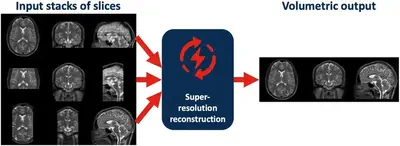KDC Africa PhD studentship [October 2025 start preferred - no later than June 2026] on "Resource-efficient slice-to-volume MRI super-resolution reconstruction for improved meningioma management in Sub-Saharan Africa"
Applications are invited for a fully funded 4 years King’s Doctoral College London Africa PhD Studentships (including tuition fees, annual stipend and consumables) starting preferably in October 2025 and no later than June 2026.
To be eligible, student must be an African national and be permanently resident in an African country.
This project is a collaboration with the Medical Artificial Intelligence Laboratory (MAI Lab), in Lagos, Nigeria.
Award details:
- Focus: MRI super-resolution reconstruction in Sub-Saharan Africa
- First Supervisor: Tom Vercauteren
- Second supervisor: Jonathan Shapey
- Third Supervisor: Udunna Anazodo
- Funding type: 4-year fully-funded PhD studentship including stipend, tuition fees, research training and support grant (RTSG), visa and HIS fees.
- Application closing date: 02 March 2025
- Start date: October 2025 prefered and no later than June 2026

Aim of project
This project aims at improving the quality of brain MRI data available for meningioma management in sub-Saharan Africa (SSA) through the development of novel resource-efficient artificial intelligence algorithms.
Project description
Access to MRI in SSA is restricted and its quality is limited by the hardware available locally. While high-resolution high-field-strength volumetric brain MRI is typically acquired in developed countries, a typical approach used in SSA relies on acquiring stacks of low-resolution low-field-strength slices as these are faster to acquire and more suitable for locally available MR scanners.
Meningiomas are the most common primary brain tumours in adults. The wide range of presentation they are associated with spans from slow-growing lesions to highly aggressive ones. This makes therapeutic approaches challenging and highly dependent on radiological findings, the latler directly depending on MRI quality.
We have shown in previous work for fetal brain and abdominal MRI (where slice-based acquisitions are used in developed countries to combat motion artifacts) that slice to volume approaches can effectively be used to reconstruct high-quality volumetric MRI from stacks of 2D MRI slices. Yet, these approaches typically necessitate important computational resources which would lead to a bottleneck for their clinical translation in SSA. In this project, the student will design efficient learning-based approaches for this problem and validate its usefulness using real-world meningioma data acquired in Nigeria. A close collaboration with local radiographers and clinicians associated with the Medical Artificial Intelligence Laboratory (MAI Lab) in Lagos will ensure practical relevance.
The supervisory team combines the wide range of inter-disciplinary expertise required to successfully deliver on this project. Tom Vercauteren (first supervisor) brings his machine learning background and track record in developing translational image computing solutions. Jonathan Shapey (second supervisor) brings his neurosurgical expertise and experience in integrating AI-defined devices in the clinical workflow. Udunna Anazodo (lead external partner) brings her quantitative neuroimaging expertise and her leadership in improving access to diagnostic imaging for global health. Below are two relevant papers from the team illustrating the strength of the track record for the project both in terms of engineering methodology and global health impact.
This project is a collaboration with the Medical Artificial Intelligence Laboratory (MAI Lab), in Lagos, Nigeria (https://mailab.io/). As part of this proposed project, the MAI Lab is committing to providing local expertise as well as meningioma data. We will also seek to organise at least one on-site visit / short placement from the PhD student to the MAI Lab in Lagos.
Expected academic background and academic eligibility critwria
Outstanding students with a solid background in data science are invited to apply for this PhD project. There is an expectation of good communication and teamwork. Experience in medical imaging, especially handling MRI scans, would be advantageous.
Academic eligibility criteria:
- Bachelor’s degree with 2:1 honours in Applied Mathematics / Mathematics, Computer Science, Physics, Biomedical Engineering or another engineering-related discipline
- A 2:2 Bachelor’s degree may be considered only where applicants also offer a Master’s degree with Merit or above.
- Outstanding students with a solid background in data science are invited to apply for this PhD project. There is an expectation of good communication and teamwork. Experience in medical imaging, especially handling MRI scans, would be advantageous.
We welcome eligible applicants from any personal background, who are pleased to join diverse and friendly research groups.
For information on our English language requirements and whether you need to complete an English language test, please see King’s English Language requirements page.
Suggested reading
- Ebner, M., Wang, G., Li, W., Aertsen, M., Patel, P. A., Aughwane, R., … & Vercauteren, T. (2020). An automated framework for localization, segmentation and super-resolution reconstruction of fetal brain MRI. NeuroImage, 206, 116324. https://doi.org/10.1016/j.neuroimage.2019.116324
- Anazodo, U. C., Ng, J. J., Ehiogu, B., Obungoloch, J., Fatade, A., Mutsaerts, H. J., … & Consortium for Advancement of MRI Education and Research in Africa (CAMERA). (2023). A framework for advancing sustainable magnetic resonance imaging access in Africa. NMR in Biomedicine, 36(3), e4846. https://doi.org/10.1002/nbm.4846
Application Process
Please submit an application for the Biomedical Engineering and Imaging Science Research MPhil/PhD (Full-time) programme using the King’s Apply system. Please include the following with your application:
- A PDF copy of your CV should be uploaded to the Employment History section.
- A 500-word personal statement outlining your motivation for undertaking postgraduate research should be uploaded to the Supporting statement section.
- Samples of relevant work (e.g. publications, MSc thesis, software repository) and reference letters can also be provided in support of the application.
- Funding information: On the ‘Funding’ Section of your King’s Apply application, you MUST tick the box at item 5 (Award Scheme Code or Name) and enter the funding code: BMEIS_AFRICA_TV (Please copy and paste the code exactly!). Failing to include this code might result in you not being considered for this funding.
More information here.